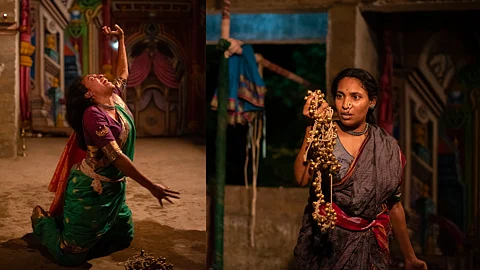
- HOMEGROWN WORLD
- #HGCREATORS
- #HGEXPLORE
- #HGVOICES
- #HGSHOP
- CAREERS
- ABOUT US
- CONTACT US

In Delhi, within the decrepit walls of an abandoned factory building, an opera takes place. Money, an unexpected protagonist, leads a cast of characters, each embodying ambition, greed, guilt, morality, desire, love, and community. The audience granted the power to choose their viewing experience, finds themselves immersed in a theatrical spectacle but are in little control of what occurs inside the building.
Amitesh Grover, the visionary behind this production, conceived The Money Opera with a singular purpose: to expose the essence of contemporary society. For all intents and purposes, the opera is a work of fictional storytelling, set in a dystopian universe. What comes to the forefront is how profoundly money binds us. The opera reveals the hidden struggles, oppressions, and buried desires of those at society's fringes and the power of those few at its core.
It shapes characters such as a young billionaire, a ghost, an inheritor, a landlord, a child goddess, a thief, a poet, a stockbroker, a rebel, an explorer, and several others, all of whom challenge society's façade. They elucidate the extent to which they go to survive, triumph, or fight against the system. Much like in real life, the characters inhabiting this space originate from diverse socio-cultural backgrounds, featuring a blend of professional actors and real-life professionals.
In 2019, at a special arts festival in Goa called Serendipity, Amitesh Grover surprised everyone with his creative storytelling about the famous Habib Tanvir. Taking it up a notch, he integrated the narrative with courses of food at a communal table. The following year, in the virtual expanse of the 2020 edition, Grover emerged with 'The Last Poet', an interactive performance that placed the participants into a boundless digital maze. It was an unsettling mirror to the anxieties of reality,
Throughout his body of work, a theme followed resolutely is a contemplation of capitalism's far-reaching influence. This undercurrent is present through his creations, none more evocative than 'Notes on Mourning'. Here, the ethereal notes of a traditional Oppari singer from Tamil Nadu serve as a reminder of how the relentless pace of the post-capitalist world allows little respite for mourning.
This year, Grover takes it further with The Money Opera, as a bold critique of capitalism. This layered commentary is delivered through multiple perspectives, offering insights into how money both molds and tests individuals, either forsaking or awakening them within the system. Commissioned by the Serendipity Arts Foundation, this experimental theatre production will be staged at The Factory in Okhla from September 23 to October 8.
After meticulous searching, they discovered their chosen venue: The Factory at Okhla, Delhi. For Grover, it met the criteria; with its half-built walls and an air of sinister history, it carried the weight of an unfulfilled past, an ideal venue to create a fictional universe with complex narratives.
What proves even more fascinating is the eclectic mix of actors, but also real-life professions– the performance of a stockbroker is played by a stockbroker in real life! A stockbroker assumes his role, shedding light on the common misunderstandings surrounding wealth and money creation, while narrating his experiences managing portfolios worth crores. Moreover, there is also poet who released her first collection of poetry, a compilation of anti-system verses. Among others, there is an ecologist who delves into tribal movements and an oceanographer who introduces a new species of ocean creatures that thrive on toxic materials.
Finally, the entire show unfurls in real-time, with multiple performances happening concurrently. Audience members are given the freedom to choose floors, encountering diverse characters and narratives. They dictate the duration of their immersion in each tale and character, with moments of interaction and participation woven into the very fabric of the building.
According to Grover, in this digital era, the power of theatre lies in its resistance to documentation, in its steadfast refusal to be distilled into a mere digital file. The physical theatre, is not merely creating a performance, but fashioning an entire universe of immersion and participation.
You can book your tickets here.
If you enjoyed reading this, here's more from Homegrown:
Hum Log: The Enduring Relevance Of India’s First Soap Opera
From Steampunk Operas To Found Footage: A History Of Aliens In Indian Cinema
So Bad, It’s Good - Indian Star Wars Calls Itself A Superhero Space Opera
